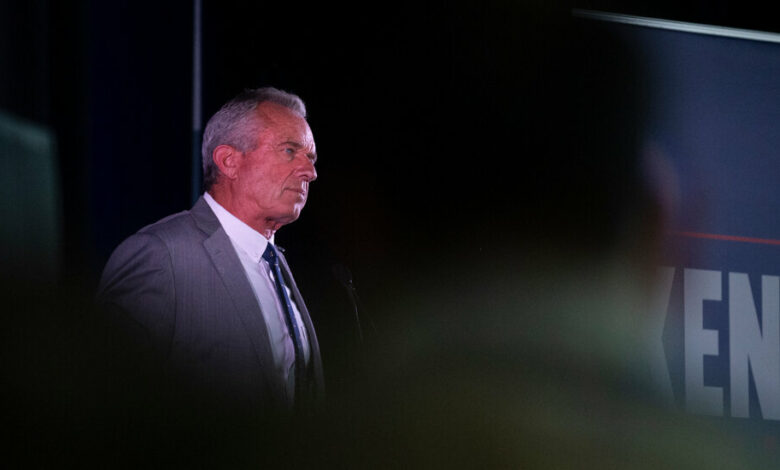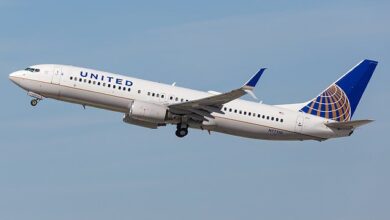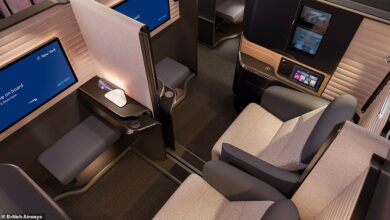Lack of funds pushes Kennedy into costly ballot battle

Robert F. Kennedy Jr.’s independent presidential campaign is costing a lot of money, racking up huge debts and being forced to lay off people as the campaign focuses almost exclusively on the costly effort to get his name on state ballots.
The problems, detailed in federal documents and interviews with nine people with knowledge of the campaign’s operations, have left little money for events and other traditional campaign priorities, leading to a growing sense of unease among some staffers and longtime supporters. Fundraising has slowed and the campaign has become dependent on Mr. Kennedy’s wealthy running mate, Nicole Shanahan, who last month pumped $2.5 million more into the campaign.
As the campaign continues, Kennedy allies have quietly raised money for a new organization to support legal challenges to ballot access, documents and interviews show, effectively creating a separate funding operation.
The ballot litigation group — called the Ballot Freedom Fund and founded in Delaware in May by a lawyer with ties to Mr. Kennedy’s campaign — could ease the financial burden on the campaign, which would otherwise have to foot the legal bills itself. The group, a tax-exempt political organization, can raise unlimited money but cannot work with the campaign.
The group’s formation underscores the extent to which Kennedy campaign leaders increasingly view access to the ballot box as not only necessary to his viability as a candidate but also as a rallying cry.
Five of the people who spoke to The New York Times were former campaign workers, including two who recently lost their jobs and said they were told it was because of financial shortfalls. All requested anonymity, with some citing confidentiality agreements. Many said they still supported Mr. Kennedy and spoke partly out of concern that his campaign was failing.
A campaign spokesman declined to comment. On Thursday, the campaign sent an email detailing its efforts to secure ballot access, including legal challenges in several states.
“The campaign’s aggressive ballot access operation has exceeded all milestones to ensure the Kennedy-Shanahan ticket is on the ballot in all 50 states and the District of Columbia,” the email said. “The ballot access operation is fully funded with over $15 million raised.”
It won’t be clear how much the Ballot Freedom Fund has raised or spent until it files a list of donors and expenditures with the Internal Revenue Service this month.
According to a person familiar with campaign activities, campaign officials were told in early June that the new fund had raised at least $500,000 and that another million donors were planned.
The Kennedy campaign’s state-by-state race to get on the ballot is an expensive and time-consuming undertaking that requires collecting hundreds of thousands of signatures and submitting petitions to local officials. Mr. Kennedy has so far officially gained access to the ballots in seven states, including Michigan, a key battleground.
The campaign has paid $5.4 million this year, through the end of May, to Accelevate 2020, the leading ballot access company.
The Ballot Freedom Fund lists a simple mission on a May federal tax return: “To create a fair and simple electoral system that promotes greater choice and true freedom in America.” There is no reference to Mr. Kennedy.
But several insiders said the group was created by Kennedy’s allies, primarily to fight legal action by his opponents, including the Democratic National Committee.
The fund was established by Andrew D. Hurd, a Colorado attorney, according to Delaware records. Mr. Hurd is married to Robyn Ross, a lawyer for the Kennedy campaign.
The federal tax return The May report names two directors of the fund: Mr. Hurd and Michael Baum, a partner at the Los Angeles law firm Wisner Baum who has been a close professional ally of Mr. Kennedy for years.
In an email, Mr. Hurd said: “Ballot Freedom Fund was established to finance offensive and defensive ballot access processes for independent candidates. It may engage individual campaigns on ballot access issues, but does not coordinate with a campaign on expenditures that would affect a federal election.”
The Kennedy campaign is expected to continue its own ballot access efforts, which are focused primarily on collecting signatures and filing petitions, while the fund covers legal costs. The campaign says on its website that it is still hiring state directors “in all 50 states” to lead these efforts.
The Democratic Party and its allies, concerned that Kennedy could steal critical votes from President Biden, have said they are closely monitoring Kennedy’s petitions. The DNC has already quietly supported or coordinated legal challenges to Kennedy’s efforts to gain ballot access in at least three states, according to two people with knowledge of the challenges.
The Kennedy campaign, in turn, has filed federal lawsuits in at least four cases. states like Nevada and New York, where they are challenging restrictions on ballot access.
The creation of the Ballot Freedom Fund is the latest example of a growing trend of federal campaigns offloading their spending to outside organizations. These organizations can accept checks of unlimited size, but are legally prohibited from working directly with a campaign.
The focus on ballot access comes as the campaign has scaled back spending on events and other typical campaign priorities in the months before an election. Several top staffers responsible for events have been laid off in recent weeks. The campaign’s public calendar shows only one in-person event, a sailing trip with Mr. Kennedy in Hyannis Port, Mass., billed on its website as a “once-in-a-lifetime” opportunity.
Jeffrey Rose, a hypnotist and longtime friend of Mr. Kennedy who is raising money for the campaign, said he saw the lack of expensive fundraising events as a positive sign that there was no financial crisis. “If they were more desperate, they would probably have more fundraisers,” he said, adding that he found it relatively easy to raise money now.
Small-dollar fundraising has fallen by about a third since its peak in March, according to campaign documents. Independent and third-party candidates often lose momentum as the general election approaches, and the focus has shifted to former President Donald J. Trump and Mr. Biden.
Amaryllis Fox, the campaign manager for Kennedy and his daughter-in-law, said in an interview last week with NPR that his fundraising slowed due to “the economic hardships of many of our supporters.”
Mr. Kennedy’s campaign had $6.5 million on hand as of May 31, not counting $2.7 million owed to his security team, the filings show. The campaign raised just $2.6 million in May and spent $6.3 million, including more than $2.8 million on Accelevate 2020, his ballot access company.
Five people, including two who have been fired by the campaign in recent weeks, said they were told directly by senior campaign officials and consultants that the campaign had run out of money for everything but ballot access. One person, who spoke on condition of anonymity because of a confidentiality agreement, said he was told the campaign had just $600,000 left in mid-June, after setting aside more than $5 million for unpaid bills.
What sets Kennedy’s campaign apart from others is its access to someone who can immediately throw millions of dollars at it: Ms. Shanahan, a Silicon Valley investor and lawyer who was previously married to Google co-founder Sergey Brin.
She joined the ticket in late March, providing a much-needed source of cash. Of the $18.5 million the campaign raised in March, April and May, more than half came from Ms. Shanahan — $2 million in March and $8 million in April. She gave almost nothing to the campaign in May.
Ms. Shanahan, in a rare television interview last month, asked whether she would donate more to the campaign: “Yes, my goal is to make sure we are on the ballot.”
Ms. Shanahan made a large donation to support Mr. Kennedy last month, according to three people with knowledge of the matter. One of those people, who had direct knowledge of the donation, said she gave $2.5 million directly to the campaign in June, not to the Ballot Freedom Fund.
The campaign originally hired a veteran Democratic fundraiser, Sheila Creal, to oversee the creation of a 50-person National Finance Committee, with each member committing to pooling at least $100,000 for the campaign, but it is unclear whether it is active. Some people who said they joined now say they ultimately did nothing of substance. Ms. Creal has since left the campaign, which has not released a list of the poolers.
Mr. Kennedy is trying to beef up his small fundraising, even going so far as to start place a 90 second robocall to voters for financial support.
“Press 1 and you will be connected to an agent who is ready to speak to you,” says Mr. Kennedy.
Alain Delaquérière contributed to research.




